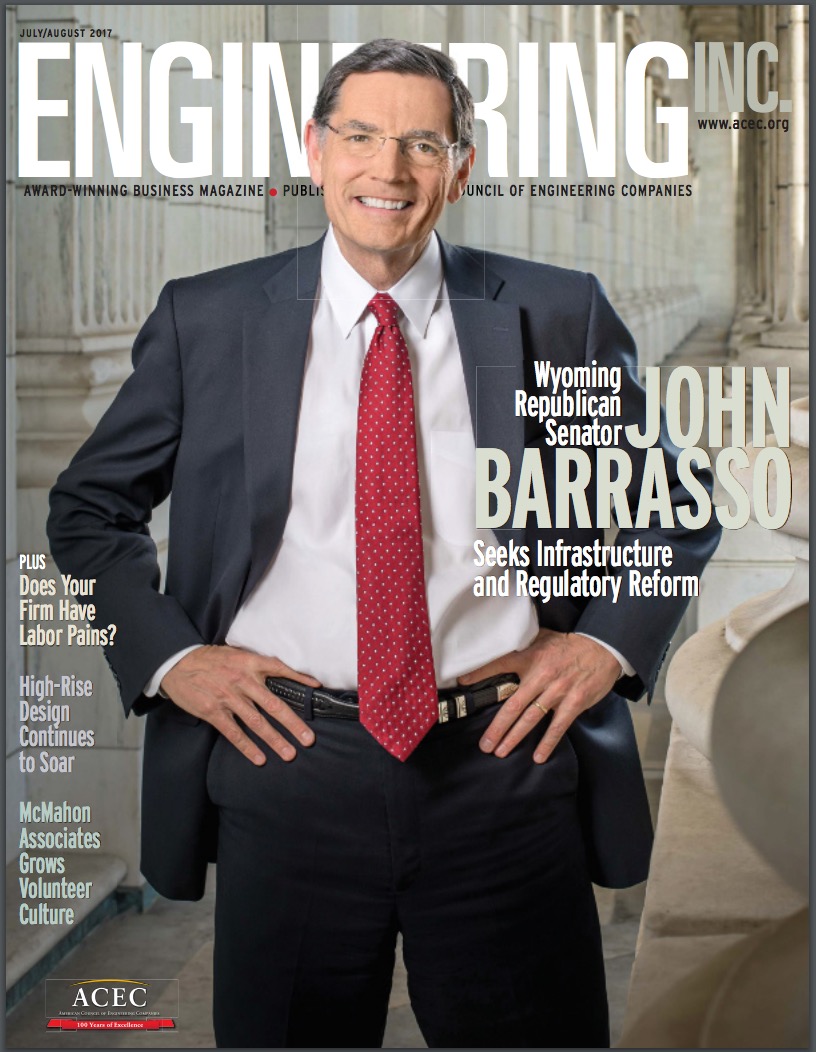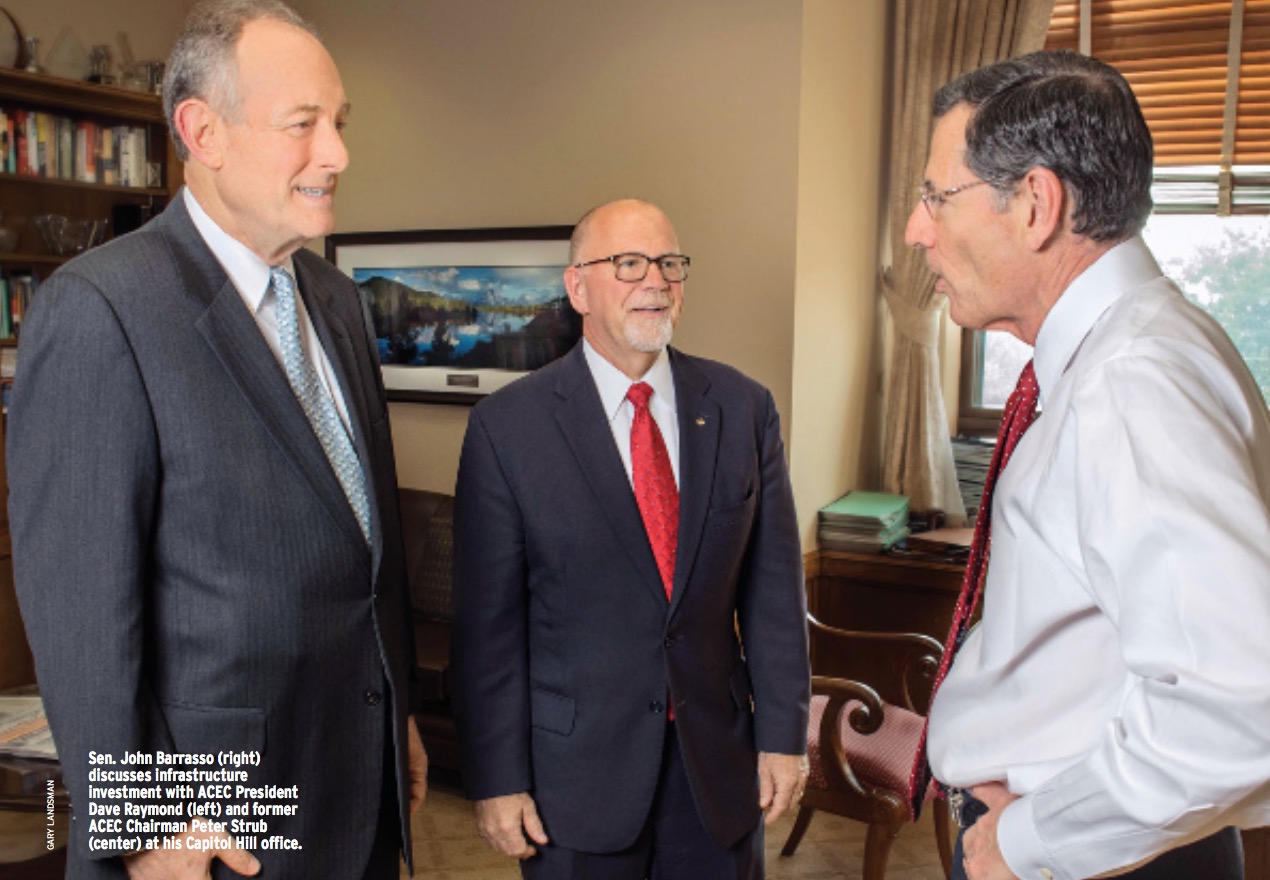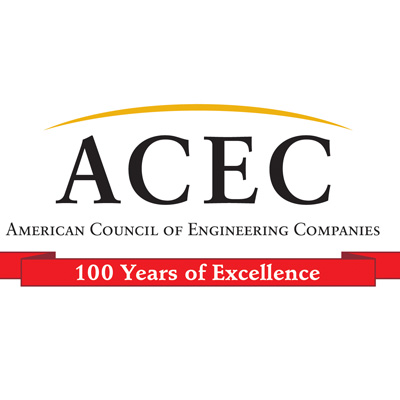AMERICAN COUNCIL OF ENGINEERING COMPANIES (ACEC)
THE DOCTOR IS IN: Sen. John Barrasso
 Despite a never-ending legislative to-do list, regulatory reform and the nation’s crumbling infrastructure are emerging as key policy priorities for Congress and the new presidential administration.
Despite a never-ending legislative to-do list, regulatory reform and the nation’s crumbling infrastructure are emerging as key policy priorities for Congress and the new presidential administration.
In an exclusive interview with Engineering Inc., Sen. John Barrasso, R-Wyo., discussed his vision for infrastructure investment, regulatory reforms and energy legislation.
“I am working with the new administration to address our infrastructure priorities and find fiscally responsible ways to start building,” says Barrasso, chairman of the Environment and Public Works Committee.
After 24 years as an orthopedic surgeon—known by many as Wyoming’s Doctor—he was elected to the Senate in 2008.
Re-elected in 2012 with over 75 percent of the vote, he also serves on the Committee on Energy and Natural Resources, the Committee on Indian Affairs and the Committee on Foreign Relations.
ACEC: Mr. Chairman, the new administration and new Congress bring new opportunities. What are your key agenda items for 2017?
Sen. John Barrasso: Our committee is already off to a fast start. In February, the Senate confirmed Oklahoma Attorney General Scott Pruitt to lead the Environmental Protection Agency [EPA], and we know that several more nominees will be going through our committee in the coming months.
We have held important oversight hearings on issues like our nation’s infrastructure needs. Specifically, we must upgrade our roads, bridges, dams and water systems. Doing so will bring our infrastructure into the 21st century. This is a shared goal with President Trump’s administration, but we need to make sure the needs of rural communities are included.
We have also examined laws that need to be updated, in order to ensure they are working to protect the environment and the interests of the American people. We need to prioritize conservation by modernizing the Endangered Species Act. We need to ensure that endangered species are being recovered to the point they can be delisted.
We must also encourage the use of more clean energy by promoting innovation in the nuclear energy field. Just recently, I introduced the Nuclear Energy Innovation and Modernization Act with a bipartisan group of senators. This legislation will simplify regulation and promote innovation in the nuclear sector.
The administration and Congress have already begun work to roll back harmful regulations from the Obama era that burden American families, small businesses and stifle economic growth with little environmental benefit. The president issued an executive order to revise the government’s rules regarding Waters of the United States. We will also continue to work to limit rules the Obama administration set forth in the Clean Power Plan.
Overall, I believe we have a unique opportunity. It is important we take the necessary measures to preserve and protect our environment while also promoting innovation, modernization and economic growth. Those goals are not mutually exclusive.
ACEC: President Trump has identified infrastructure investment as a priority for his administration, and the committee you now chair—the Environment and Public Works Committee—will play a key role in moving that legislation forward. Is this something that Congress can get done this year, and what would you like to see in this package?
Barrasso: I am optimistic the administration and Congress can work together to improve the country’s aging roads, bridges, dams and water systems. Much of our nation’s infrastructure is old, outdated and in need of repair. We need to invest in modernizing our infrastructure for the safety of Americans and to promote interstate commerce and nationwide economic growth.
On the Environment and Public Works Committee, we’ve been holding infrastructure hearings. They focused on updating infrastructure in rural areas and on failing flood control systems.
Across all building projects, the committee will work to remove punishing regulations from Washington that limit economic growth. Bureaucrats shouldn’t just use a top-down, one-size-fits-all approach. We need to be smarter about these rules and more aware of the effect they have.
When updating our infrastructure, we cannot overlook rural projects, as what affects rural areas in turn affects the rest of America. Roads stretching across rural lands are widely used to transport goods to big cities, and water systems in rural areas can affect agriculture production on which urban areas also rely.
Additionally, when rural flood control systems fail, rural communities suffer greatly and often lack necessary funds and resources to clean up and repair the damage. In any infrastructure legislation, we cannot forget about rural needs. Just because most of the population doesn’t drive on these roads every day or directly work on the farms and ranches doesn’t mean they don’t rely on them too.
ACEC: You have raised a number of concerns over various regulatory actions coming from the EPA in the previous administration. What role will the committee take this year in advancing a regulatory reform agenda?
Barrasso: With administrator Pruitt’s confirmation to head the EPA, I have great confidence that many harmful Obama-era rules will be overturned. In February, the president signed an executive order on the Waters of the United States rule that instructed the EPA to either revise or completely rescind the rule.
While regulatory reform has already begun, we need to look at legislation to further undo harmful rules. I have introduced a resolution as part of the Congressional Review Act to remove the Bureau of Land Management’s harmful and duplicative rule on methane emissions from oil and gas operations on federal and Indian land. The EPA and many states already regulate methane emissions.
The committee will also work to streamline regulation to allow for roads, bridges and other public works projects to be built more quickly and efficiently
 ACEC: You’ll also play an important role in advancing energy legislation, which came close to passing but ultimately stalled in 2016. What are your priorities for energy policy, and what’s the outlook for passage of a comprehensive energy bill in 2017?
ACEC: You’ll also play an important role in advancing energy legislation, which came close to passing but ultimately stalled in 2016. What are your priorities for energy policy, and what’s the outlook for passage of a comprehensive energy bill in 2017?
Barrasso: I introduced a bipartisan nuclear energy bill that will encourage nuclear energy development by modernizing regulations for nuclear reactors. We need an energy policy that includes a diverse energy mix to not only promote clean energy but also to secure our energy independence, support innovation and create jobs. I have partnered with several senators on both sides of the aisle on this legislation. I expect it will pass our committee and advance to the full Senate.
I also think it’s important to have national energy export policies that help reduce our nation’s trade deficit and also strengthen the energy security of our allies who want to buy our gas and coal. For energy production, we need to make sure permits are issued in a timely manner for on and offshore production and allow for the construction of new pipelines.
ACEC: Congress enacted a water resources bill at the very end of the term in 2016, which ACEC strongly supported. Will the committee advance additional water resources legislation in this Congress, and what are your goals in the area of water infrastructure?
Barrasso: The committee held a hearing on water infrastructure and flood control systems. We need to modernize our water infrastructure to keep Americans safe and commerce flowing. This includes clean water and safe drinking water infrastructure, as well as locks, dams and levees. I expect these to be a major part of any infrastructure package that passes this Congress. For specific legislation, Congress is back on track to enact a Water Resources Development Act [WRDA] every two years. I plan to begin work on WRDA 2018 at the beginning of next year. I expect the bill will address all the Army Corps of Engineers’ mission areas, including flood control and navigation.
Download full article (PDF): The Doctor Is In – Sen. John Barrasso
Download July/August issue of Engineering, Inc.
 About the American Council of Engineering Companies
About the American Council of Engineering Companies
www.acec.org
The American Council of Engineering Companies (ACEC) is the voice of America’s engineering industry. Council members – numbering more than 5,000 firms representing more than 500,000 employees throughout the country – are engaged in a wide range of engineering works that propel the nation’s economy, and enhance and safeguard America’s quality of life. These works allow Americans to drink clean water, enjoy a healthy life, take advantage of new technologies, and travel safely and efficiently. The Council’s mission is to contribute to America’s prosperity and welfare by advancing the business interests of member firms.
Tags: ACEC, American Council of Engineering Companies, Engineering, Engineering Inc., Engineers, Environment and Public Works Committee, Regulatory reform, Senator Barrasso, Senator John Barrasso






 RSS Feed
RSS Feed